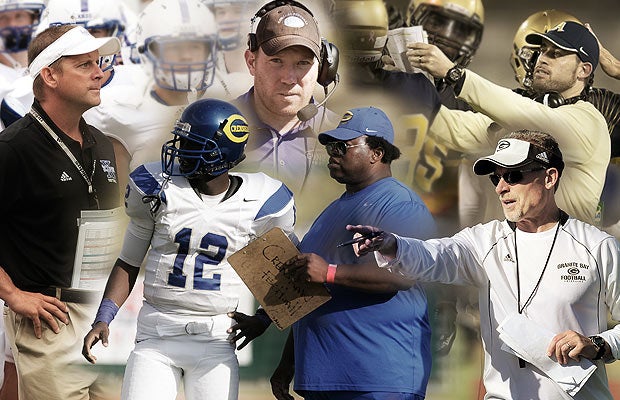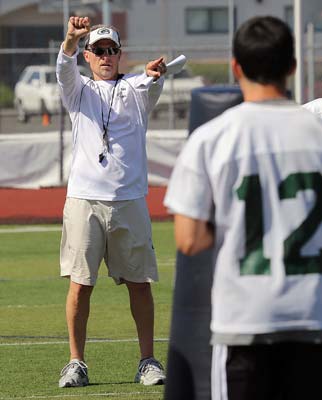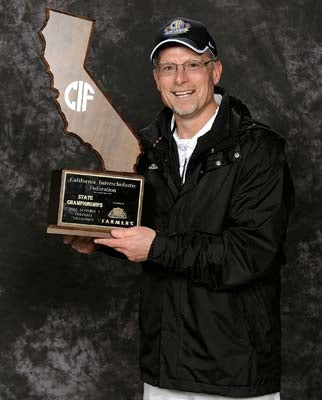
Coaching high school football is about so much more than substitutions and calling plays. Coaches must deal with many duties, and some of it can easily lead to burnout.
Graphic by Ryan Escobar/Photos by MaxPreps photographers
Ernie Cooper retired from his head football coaching job at
Granite Bay (Calif.) last week. It was for the 10th time, he said, since the end of the glorious state-championship 2012 season.
It was after the first day of spring practice, a 14.5-hour ringer filled with three weight training classes, four college recruiting visits, a frustrating 7-on-7 scrimmage and a post-practice meeting with an aspiring high school program looking for pointers.
Needless to say, Cooper didn't reveal his darkest, most fleeting thoughts to the eager, young coaches. Quite the contrary.
Cooper, after all, is a prep football coaching lifer.
"I always un-retire the next day," said the 51-year-old with a twinkle in his eye. "Or two days later.
"I didn't tell anyone (last week), but I know exactly what everyone is going through."
When he refers to "Everyone" he is referencing a country full of under-paid, over-worked gents (and a few women) who make a living in the vital but unglamorous field of coaching high school football.
With growing economic and recruiting demands and fewer resources, the pressures on high school football coaches appear to be taking their toll. Younger coaches are leaving their posts earlier, looking for better-paying jobs, better coaching opportunities or just getting out of the profession all together.
It's even happening in two of the nation's most high-profile football states.

Ernie Cooper gives instruction to players during recent
spring drills at the Granite Bay football stadium.
Photo by Gregg Samelson
According to
FloridahsFootball.com, more than 130 Florida schools will have new football coaches by the first game next season. In the Lone Star state, according to
Texasfootball.com, 150 head prep football coaches from 2012 left their positions.
These numbers are consistent, even a tad below, the national annual average of 20 percent head coaching turnover.
It's not an easy life. It's one that requires coaches to balance multiple responsibilities (many not having anything to do with the sport) along with the usual demands that husbands, fathers and sons face. If not done correctly, it can lead to marital problems or burnout. All coaches face those demands to some degree, but in football, the stakes are much higher.
The coaching carousel leads to less continuity, familiarity, leadership and foundation for the kids — all things Granite Bay kids count on and what always keeps Cooper coming back.
He's the only head coach in the school's 17-year history and with eight on-campus coaches, Cooper isn't going anywhere. Actually, he's always going somewhere. He's a ball of effervescent energy, moving from one task, player, goal, play and exercise to another — all day, every day until he drops.
By the end of each season – or particularly long day — he's ready to hang ‘em up, ship out and move on, or at least get a good night's rest to recharge.
If ever there was a good retirement spot to jump off, it was after Granite Bay landed firmly on the national map with a 21-20 win over one of the country's most storied programs, Long Beach Poly, for the CIF state Division I title last season.
He was named the Cal-Hi Sports Coach of the Year while improving his Granite Bay record to 155-43-1. He also won his second-straight Sac-Joaquin Section Division I title – Granite Bay's fifth overall – to go along with 10 league titles.
But winning is only a byproduct of what Cooper is all about, said 25-year Sacramento Bee sports writer Joe Davidson.
"Ernie talks about burning the candle at both ends, of bags under his eyes late in seasons, but he lives for this," Davidson said. "He loves to mentor players, build teams, take on great competition and win. Winning cures all.
"He's as good as it gets in Northern California."
Considering that 39 seniors – including most of the key players - graduated from that group, Cooper could have joined the retirement party.
But thoughts of leaving are truly fleeting. He understands the recent rash of coaching vacancies — he lives and breathes their pain — but he soaks in and reaps all the deep rewards.

Cooper proudly displays the trophy after his team's
victory in the CIF state Division I title game last season.
File photo by Heston Quan
"This job has a lot of demands because of people's expectations," he said. "It's not just the winning part, it's everything. Some days you ask yourself 'Why do I want to do this?'
"But most days I go out there and see all the guys. You see the energy in the room and they're pumping up each other. … I've tried to take a year off but I just can't do it. There's new kids and a tradition to uphold."
On this day, Cooper is particularly pumped because it's testing day. Around the weight room and on the practice field his imprint is everywhere.
From the 100 names over 17 years for making the Top 10 list of 10 training categories, to the photos of previous Grizzlies to make it to the NFL — Miles Burris (Raiders), Devon Wylie (Chiefs), Adam Jennings (Falcons), Dallas Sartz (Redskins) and Sammie Stroughter (Buccaneers) — to the life and team credos, Grizzly pride is plastered all over the walls of the Mark Palmer Training Center.
More than words and name, Cooper's energy charged the facility as he tested more than 200 kids on the clean and jerk. He charted each student, examined their form, barked instructions and mostly encouraged.
"Nice clean," he yelled to one kid. "Atta baby."
"You guys did a hell of a job!"
"Now the fun begins!"
"Don't cut corners!"
"Don't be in a hurry. Do it right!"
Granite Bay senior Kevin Blank, a 6-foot-2, 250-pound offensive lineman headed to Cal Lutheran helping as a student aid, said what you see and hear is exactly what you get with Cooper.
"He energizes everything," Blank said. "He helped form who I am and really helped my high school career."
That is the real reason Cooper and all successful high school football coaches survive and come back for more.
For eight hours we followed Cooper's day. He didn't want to be singled out – another typical high school coaching trait — but he also had a lot to say.
We needed to ask just eight questions to complete a 1 hour, 15-minute interview. What he revealed then and during that mild spring day is how Cooper has thrived and survived. It likely mirrors many of the systems and beliefs of coaches throughout the country who have endured.
See some coaches' stories of how they make it all work (on page 5), and in no particular order, here are 13 shades of Cooper, a vital American high school football coach.
Video by Chris Spoerl and Scott Hargrove/Edited by Chris Spoerl
